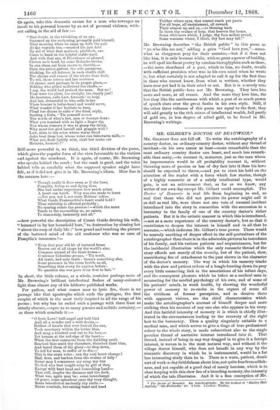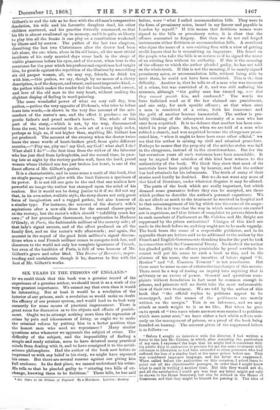MR. GILBERT'S DOCTOR OF BEAUTYEIR.*
Mn. GILBERT does not fall off. To write the autobiography of a country doctor, an ordinary country doctor, without any thread of incident—in his own career at least—more remarkable than the most ordinary country doctor can boast, and much less remark- able than many,—to recount it, moreover, just as the man whom he impersonates would in all probability recount it, without throwing more of passion or less of dry fact into it than his hero should be expected to throw,—and yet to rivet his hold on the attention of the reader with a force which few stories, though of a highly romantic or of a subtly intellectual type, would gain, is not an achievement that, as far as we know, any writer of our own day except Mr. Gilbert could accomplish. The Doctor of Beauweir is real life from beginning to end, so real that those who did not perceive its power might call it as dull as real life, were there not one vein of unusual incident introduced into the story in connection with the succession to a baronetcy in the family of one of the country doctor's richer patients. But it is the artistic manner in which this is introduced, —not as a mere experience of the country doctor's, but so that it contributes to deepen the interest in himself and in all that he narrates,—which indicates Mr. Gilbert's true power. There would be scarcely anything of deeper effect in the self-portraiture of the autobiographer than there is in the admirable pictures he introduces of his family, and his various patients and acquaintances, but for the incidental illustration which the only romantic thread of the story affords not merely of the tenacity, but of the patient, slow, smouldering fire of attachment to the past shown in the character of the doctor's memory. The way in which his memory tracks with the slow and patient ardour of a beagle hunting down its prey every little connecting link in the associations of his infant days, and the consequent pleasure which he takes as a medical man in accounting for the morbid psychology of his own, and of some of his patients' minds, in weak health, by showing the wonderful power of memory to re-excite in the organs of sense all the vividness of former perception, and so deceive them with apparent visions, are the chief characteristics which make the autobiographer's account of himself deeper and more striking than his account of any one else who appears in his story. And this faithful intensity of memory it is which is chiefly illus- trated in the circumstances leading to the recovery of the right heir to the baronetcy. Thus a quality singularly suitable to a medical man, and which serves to give a tinge of true professional colour to the whole story, is made subservient also to the single peculiar thread of narrative interest introduced into it. That thread, instead of being in any way dragged in to give it a foreign interest, is woven in in the most natural way, and without it the village doctor himself, who does not benefit in any way by the romantic discovery in which he is instrumental, would be a far less interesting study than he is. There is a worn, patient, dumb sort of work-a-day faithfulness about him, not quite free from selfish- ness, and yet capable of a good deal of manly heroism, which is in close keeping with this slow fire of a brooding memory, the intensity of which the tale illustrates. And it is a fine conception of Mr.
• The Doctor of Beautreir. An Autobiography. By the Author of " Shirley Hall Asylum," "De Protundle," &c. 2 vole. London: Tinsley.
Gilbert's to end the tale as he does with the old man's comparative desolation, his wife and his favourite daughter dead, his other children scattered, and his practice formally renounced, so that - his life is almost swallowed up in memory, and it is quite at liberty to play him all the freaks it can play on a constitution weakened by illness and by sorrow. The pathos of the last two chapters, describing the last two Christmases after the doctor had been left alone, the one when, alone in his old house, all the most trivial incidents of his early married days come back in the shape of visible phantoms before his eyes, and of the next, when true to the reverence for the poor which his professional experience had taught him, he guards against the repetition of the illusions by assembling six old pauper women, all, we may say, friends, to drink tea with him,—this pathos, we say, though by no means of a showy description, is of the deepest, and truest, and most impressive kind, — the pathos which makes the reader feel the loneliness, and sorrow, and love of the old man to the very heart, without making the slightest display of feeling in word-painting.
The same wonderful power of what we may call dry, iron pathos,—pathos the very opposite of Dickens's, who tries to infuse tears into words,—is shown in the very fine account of the mis- conduct of the rector's sou, and the effect it produces on his gentle father's and proud mother's hearts. The whole of this part of the story,—which is not, by the way, disconnected from the rest, but is essential to it,—is art of a very high order, perhaps as high as, if not higher than, anything Mr. Gilbert has yet produced. The account of the evening when the doctor twice hears the same words of heart-broken grief, from quite different mouths,---" Pity me, pity me ! my God, my God ! what shall I do ? What shall I do ?"—the first time from the widow of the labourer who has just died from hydrophobia, and the second time, in pass- ing late at night by the rectory garden-wall, from the hard, proud woman whose idolized son has just broken her heart, is one of the finest efforts of Mr. Gilbert's genius.
It is a characteristic, and in some sense a merit of this book, that no single passage would give with the least fairness a specimen of its power. It is not till one gets to the end that one realizes how powerful an image the author has stamped upon the mind of his readers. But it would not be doing justice to it if we did not say that, in its own sober, realistic style, the story shows not only great force of imagination and a rugged pathos, but also humour of a similar type. For instance, the account of the doctor's wife's aspirations after a new silk dress for the annual dinner-party at the rectory, lest the rector's wife's should " infallibly crush her own ;" of her proceedings thereanent, her application to Madame O'Grady, de Paris, the fashionable milliner of the country side; of that lady's signal success, and of the effect produced on all the family first, and on the rector's wife afterwards ; and again, the account in the sequel of the good Irish milliner's signal discom- fiture when a real French milliner comes to compete with her, and discovers to the world not only her complete ignorance of French, but even of the localities of Paris, is full of true humour of Mr. Gilbert's grave and sober kind. The Doctor of Beauweir, unpre- tending and unelaborate though it be, deserves to live with the best of Mr. Gilbert's works.



































 Previous page
Previous page